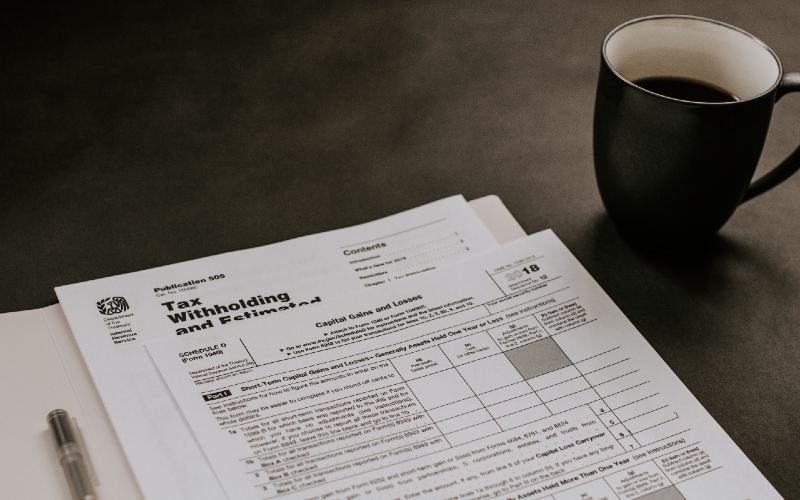If you’re a property investor and you’ve been delaying your tax return preparation, it’s not too late to start taking steps to maximise your tax refund.
We’ve put together a guide on how property investors can get their finances in order before EOFY, how to maximise your tax refund, and what property expense claims the Australian Taxation Office (ATO) will be keeping a close eye out for this financial year.
Top tips to get your finances in order before EOFY
Most Aussies tend to put off doing their tax return until the last minute but Kasey McDonald, Head of Leasing and Growth at :Different said it’s especially important for property investors to start preparing early due to the more complex nature of their returns.
“Ensure you’ve got the bones of your tax lodgement ready before you visit your accountant (i.e. key statements and invoices for that year) so your tax returns can be lodged quickly and easily,” she told Savings.com.au.
“Talk to your property manager to ensure you have all the bits you need to make the right claims on your property.”
In a recent survey conducted by :Different, 78% of property owners said compiling statements and receipts was their biggest tax-time pain point.
“For our customers we rolled out EOFY packs, which collate all key documents they’ll need for their investment property as well as providing a breakdown of income and expenses on a spreadsheet, making it nice and easy for the tax accountant to prepare the return,” Ms McDonald said.
“It’s a small initiative but it’s one less thing they need to think about when lodging their returns.”
On top of that, make sure you’re visiting the ATO’s website to see what other incentives are available to you.
How property investors can maximise their tax refund
If you want to maximise your tax refund you need to know exactly what you’re eligible to claim - from council rates and landlord insurance to the more obscure expenses like loan establishment fees.
Ms McDonald also said it’s not too late for investors to claim deductions for property upgrades.
“Now (before June 30) is also the perfect time to update your property and push through any outstanding maintenance or tax-deductible improvement work you’d like to include in this tax year,” Ms McDonald said.
“This might be updating appliances, installing air conditioning or heating, or upgrading the outdoor deck.
“Doing it now means you can get a tax depreciation this year instead of waiting. Just make sure whatever maintenance you do, doesn’t disrupt your tenant.”
Paying your loan interest in advance could also provide you with a substantial write-off come July.
Director of Tax Communications at H&R Block Mark Chapman said property investors will need to be able to provide evidence that their property was available for rent (such as rental listings) if they want to claim deductions for when the property was vacant.
“You may have lost a tenant due to COVID-19 and then experienced a longer than normal period of vacancy due to a downturn in the rental market,” Mr Chapman told Savings.com.au.
“You’ll still have incurred fixed expenses through that period however and you’ll want to claim a deduction for them, which is only possible if the property was available for rent so being able to demonstrate that to the ATO is more important this year than ever.”
He said it’s also possible to claim deductions even if a tenant has not been paying rent due to COVID.
“The ATO COVID-19 rental property factsheet confirms that landlords can claim expenses such as mortgage interest, rates, insurance, repairs and depreciation even though the tenant is temporarily withholding rent (for example, due to a COVID-19 related loss of income).”
Other deductions that property investors can claim are interest payments when the loan has been deferred, such as via a repayment holiday.
“Even though the loan payments are deferred, interest is still charged by the bank (and rolled up into the existing loan, i.e. capitalised) therefore the expense is still incurred,” Mr Chapman said.
In addition, Mr Chapman said if you’re claiming expenses that have a private element (like for the use of a personal phone) you should set some time aside to work out what a reasonable portion of that is for the part that relates to your property investment activities, like speaking with tenants or agents.
Related: How property investors can minimise tax bill on investment property
Property expense claims the ATO will be keeping an eye out for
An ATO spokesperson told Savings.com.au the tax office will this year be cracking down on tax returns with incorrect claims for rental properties, including:
Travel to rental properties
“Unless you are in the business of letting rental properties, travel costs cannot be claimed,” the ATO spokesperson said.
Capital works
Repairs or maintenance to restore something that’s broken, damaged or deteriorating are deductible immediately.
Improvements or renovations are categorised as capital works and are deductible over a number of years.
“Initial repairs for damage that existed when the property was purchased can’t be claimed as an immediate deduction but may be claimed over a number of years as a capital works deduction.”
Expenses for holding vacant land
Investors cannot claim tax deductions on what is regarded as vacant land, even if the property investor is intending to build a rental property on that land.
Mr Chapman said tax deductions can’t be claimed until the property has received a signed certificate of occupancy and it is listed for rental with an agent.
“So, that means that anybody with a spare piece of land, anybody with a half-finished house and even anybody with a complete house that hasn’t yet been signed with an agent cannot claim for ongoing holding costs such as interest, land rates, etc,” he said.
Personal use portions of your home loan
The ATO spokesperson said if you take out a loan to purchase a rental property you can claim interest (or a portion of the interest) as a tax deduction.
“However, directing some of the loan money to personal use, such as paying for living expenses, buying a boat, or going on a holiday is not deductible.
“The ATO uses data and analytics to ensure that interest deductions are only claimed on the portion of the loan that relates directly to the rental property.”
Claims for periods when the property is not rented out or genuinely available for rent
This includes when family and friends use the property, or times when you choose to keep the property vacant - periods of personal use can’t be claimed.
Mr Chapman said the ATO regularly finds evidence of homeowners claiming deductions for their holiday home on the grounds it’s being rented out, when the only people actually using it are the owners, their family and friends (rent free).
Common mistakes property investors make at tax time
One of the most common mistakes property investors make at tax time is making incorrect claims (see above), or leaving out vital bits that could cost them hundreds or even thousands on their tax refunds.
Ms McDonald said it’s often the result of property investors simply not realising what they can and can’t claim.
“That’s why it’s important to talk to your tax accountant who will be across all the finer details of what you can and can’t claim,” she said.
Forgetting the depreciation schedule
One of the most commonly overlooked areas is the depreciation schedule.
“Property owners can claim depreciation from the wear and tear of these assets. This depreciation can be claimed in your tax return each financial year and can help you save thousands,” Ms McDonald said.
“A common misconception is that older properties will attract no depreciation claims. However, both new and old properties will hold some depreciation benefits, so make sure you consider this schedule to assist in reducing your taxable income.”
Related: How to claim depreciation on an investment property
Mike Mortlock, Managing Director at MCG Quantity Surveyors said property investors who forget about the depreciation schedule could be potentially throwing away thousands of dollars.
“At MCG, we completed a study which revealed the average loss in deductions due to investors simply taking too long to arrange for a depreciation schedule was a staggering $20,000,” Mr Mortlock wrote in a piece for the Australian Property Investors magazine.
“We even had one investor who waited almost 18 years to do a schedule and lost $41,000 in tax breaks as a result.
“In fact, if you extrapolate our findings across the nation's total investor population, Aussie landlords are potentially short $2.886 billion on their claimable losses.”
Forgetting about the property manager and accountant
Mr Mortlock said not enough property investors check in with their property manager or accountant when preparing their tax return.
“Property managers keep a running tally of deductible repairs and upgrades as part of their annual rental statement, and this will be required reading for your accountant,” Mr Mortlock said.
“In addition, your property manager will provide advice on works they can coordinate in the coming weeks that will help improve your deductions by year’s end.”
Because property manager and accountants fees are tax deductible, you can claim them in your tax refund.
Related: What does a property manager do?
Ms McDonald said your property manager should be providing you with all the relevant documents you need for your investment property at the end of the financial year.
“An end of year statement should detail items such as the total rental income for the year, total fees paid to the managing agent, out of pocket expenses like council rates, water and maintenance work to the property (and has been deducted from the rental income received) — all which need to be taken into consideration when lodging your tax return,” she said.
“Along with this statement, your tax accountant will ask you for the original receipts (tax invoices) for any expenses incurred whether paid from the rental income or privately on top of the rental tax invoices, (commonly known as your monthly statement).
“Make sure you receive these key documents from your property manager as well.”
How this property investor is preparing for tax time
With 19 investment properties under his belt, 24-year-old Sydney-based property investor/developer Wahib Wehbe is well versed in preparing tax returns.

“There are a few simple, yet incredibly effective steps I take to ensure I get the most out of it,” he told Savings.com.au.
“Firstly, I make sure all my records are up to date in my accounting software, Xero, so it streamlines the process. I gather all my expenses and outstanding bills to be paid in the current financial year, so I can claim them back.”
Aside from the basics, Mr Wehbe says it’s also important to tick off the less obvious essentials.
“For example I’ll enter all key tax dates in my diary and create a timetable in place with my accountant,” he said.
“I'll work with my property manager to get documents prepared and to have a clear idea of what I can and can’t claim.
“On top of that, I’ll write off any bad debt and ensure my superannuation obligations are up to date.”
Working with his property manager to have a clear understanding of what he can and can’t claim has been key to maximising his tax refund.
“Having a solid investment portfolio (19 properties to be exact), can get a little out of hand but my property manager :Different removes the extra layer of complexity when it comes to lodging my tax return,” Mr Wehbe said.
“Once that’s out of the way, I like to stay ahead and prepay all my bills that are due just after the financial year, so that I can claim those too.”
If you want to maximise your tax refund, Mr Wehbe says the key is the start early.
“Bring in the experts — work closely with your property manager to know how to claim correctly and make the most of your returns, have an excellent accountant or tax agent on your team to assist and guide you,” he said.
“Lastly, use a well-known accounting software and ensure that your records are organised and up to date.”
Photo by Kelly Sikkema on Unsplash

Ready, Set, Buy!
Learn everything you need to know about buying property – from choosing the right property and home loan, to the purchasing process, tips to save money and more!
With bonus Q&A sheet and Crossword!



 Harry O'Sullivan
Harry O'Sullivan














